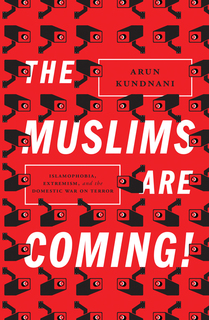Saleh Mamon reviews The Muslims are Coming! Islamophobia, Extremism and the Domestic War on Terror, by Arun Kundnani.
In this remarkably ambitious work, Arun Kundnani attempts to address two key issues: why Islam is considered the root of terrorism and how Muslim citizenship is becoming conditional on abandoning belief.
Kundnani’s thorough investigation leads him to question the web of mutually reinforcing relationships forged by the war on terror: its implication on the domestic front where we see draconian police powers, intrusive surveillance, the criminalisation of ideas, the rise of Islamophobia and the rise of a newly-‘intolerant’ liberalism whereby public intellectuals, politicians and the media shamelessly frame Muslims as the ‘enemy within’.
The evidence for the book was gathered over three years in the US and the UK, where the author carried out 160 interviews in thirteen urban locations. And he also examines the input to the extremism debate from think tanks, academics and radical thinkers past and present, and the pronouncements of politicians.
The Muslims are Coming! shows us the effect of the war on terror on US citizens. The shocking assassination of Imam Luqman, a Black Muslim, by FBI agents in Detroit after a sting operation in 2009, was followed by the extrajudicial killing, in a US drone strike, of the US citizen Anwar al-Awlaki in 2011 in Yemen. These deaths, among countless others, have become normalised under Obama’s ‘liberal’ presidency.
The war on terror, as Kundnani shows, has extended into domestic counterterrorism under the rubric of ‘preventing extremism’ and ‘countering radicalism’. Although the ideology driving such programmes may have been shaped by the events of 11 September 2001, its method involves the revival of techniques used against colonial and cold-war era counterinsurgencies. Here, Kundnani demolishes the plethora of theories – psychological and sociological – produced by intellectual servitors of state power, with a central premise: that the roots of terrorism reside in religious belief. Not only does he unravel the deeply-flawed theory of counter-radicalism but exposes the irony that it has no predictive power to identify terrorists anyway.
Despite its failures, counter-radicalism continues to target Muslim communities with the most intrusive surveillance and tries to recruit their teachers, doctors, youth workers to act as informants on extremists. This has led to fear and intimidation in the targeted communities, and divided them into ‘moderate’ and ‘extremist’ factions. By invoking the spectre of extremism, infiltrating mosques and other institutions, and using financial inducements to community leaders through programmes such as PREVENT, trust has broken down and dissent has been suppressed.
Once counter-terrorism has been institutionalised, both in the state and civil society, the threat must be kept alive, even as this book shows, if it means using entrapment (particularly in the US). By evoking a ‘Sharia conspiracy’ and presenting Islamism as a threat to western values and civilisation, Islamophobia at home has been sustained and the invasion of Muslim countries abroad been justified.
What marks this book out is the way the author contextualises events and ideas in their historical, social and political contexts. Kundnani moves from specific cases to specific events to support a general argument, then brings his analysis back to demolishing the entrenched theories that justify counterterrorism. For example he shows that among the challenges facing second- and third-generation BME young people in Britain are identity politics and state-driven ethnicism. Similarly, the different histories and interactions of Muslims in America – Arabs, South Asians and African Americans who turned to Islam – are explored, highlighting the traditions of Martin Luther King and Malcolm X.
There is an utter failure in mainstream discourse around the war on terror to consider the root causes of terrorist violence, though ample evidence shows that it is driven by political grievances about western intervention in Muslim lands, which has led to catastrophic death and destruction. Pointing out the further hypocrisy, Kundnani rightly asks why far-right acts of violence and racist murders are not considered terrorist. The very act of labelling someone terrorist is inherently political and the focus on the Muslim ‘other’ racialises the debate.
Above all this book foregrounds politics and calls for the removal of all barriers to civil liberties, freedom of speech and association for Muslim organisations and individuals. The use of repressive legal and executive powers is proving counterproductive. Such an inclusive political climate, in Kundnani’s view, would open up radical alternatives to counter the ‘so-called jihadist terrorism’.
Here is a bold and critical voice in the tradition of Eqbal Ahmad and Sivanandan, which needs to be heard and heeded by all – from the Muslim community to policy makers, media and politicians. This ground-breaking work provides all the facts and arguments that campaigners need to rise to the challenge of resisting the ever-intensifying wave of anti-Muslim racism in western societies.
RELATED LINKS
Buy The Muslims are Coming! Islamophobia, Extremism, and the Domestic War on Terror, here

